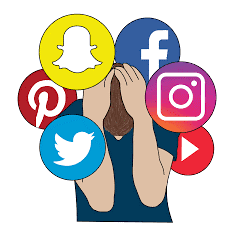In recent years, social media has become an integral part of our daily lives, transforming the way we communicate, share information, and connect with others. While social media platforms offer numerous benefits, there is growing concern about their impact on mental health. This article explores the influence of social media on society and delves into the complex relationship between digital platforms and mental well-being.
The Rise of Social Media
Social media platforms, such as Facebook, Twitter, Instagram, and Snapchat, have revolutionized the way we interact and consume information. They provide avenues for self-expression, fostering virtual communities and enabling individuals to connect with friends, family, and like-minded individuals across the globe. However, the widespread use of social media has also given rise to certain challenges that warrant careful examination.
The Perils of Comparison
One of the significant effects of social media on mental health is the tendency to engage in social comparison. Users often portray an idealized version of their lives, carefully curating posts and images to present a picture-perfect existence. This can create feelings of inadequacy and a constant need to measure up to the perceived success and happiness of others, leading to a negative impact on self-esteem and mental well-being.
Cyberbullying and Online Harassment
The anonymity and ease of communication on social media platforms have unfortunately led to an increase in cyberbullying and online harassment. Individuals, particularly adolescents, may face constant scrutiny, judgment, and even personal attacks, which can significantly impact their mental health. The 24/7 nature of social media makes it challenging to escape such negative experiences, perpetuating a cycle of emotional distress.
Fear of Missing Out (FOMO)
Social media’s real-time updates and constant stream of information can contribute to the Fear of Missing Out (FOMO) phenomenon. Seeing others engaging in exciting activities, attending events, or enjoying social gatherings can trigger feelings of isolation and exclusion. This fear of being left out can lead to anxiety, depression, and a distorted sense of reality, as people compare their own lives to carefully curated highlight reels.

The Influence of “Likes” and Validation
The prominence of “likes,” comments, and followers on social media platforms can foster a sense of validation and self-worth tied to online popularity. The pursuit of external validation can lead to addictive behaviors, as individuals seek constant approval and affirmation from their digital peers. The pressure to gain more likes and followers can negatively impact mental well-being, fostering a cycle of seeking validation from external sources rather than cultivating internal self-worth.
Promoting Positive Digital Habits
While social media can pose challenges to mental health, it is important to recognize that responsible and mindful usage can mitigate these risks. Adopting healthy digital habits, such as setting time limits, diversifying online content consumption, practicing self-compassion, and fostering meaningful in-person connections, can help create a balanced relationship with social media.
Educating and Supporting Users
Social media platforms, mental health organizations, and individuals alike have a role to play in promoting digital well-being. Public awareness campaigns, educational programs, and the implementation of features that encourage positive interactions and safe online environments can empower users to navigate social media in a healthier manner. Additionally, fostering open conversations about mental health and providing resources for support can help reduce stigma and promote well-being within online communities.
Conclusion
Social media has revolutionized the way we connect and communicate, but it also poses challenges to mental health in the digital age. Understanding the potential negative impact of social media, such as the perils of comparison, cyberbullying, FOMO, and the pursuit of validation, is crucial. By fostering responsible usage, promoting positive digital habits, and supporting individuals in their online experiences, we can harness the benefits of social media while safeguarding our mental well-being in an increasingly interconnected world.


